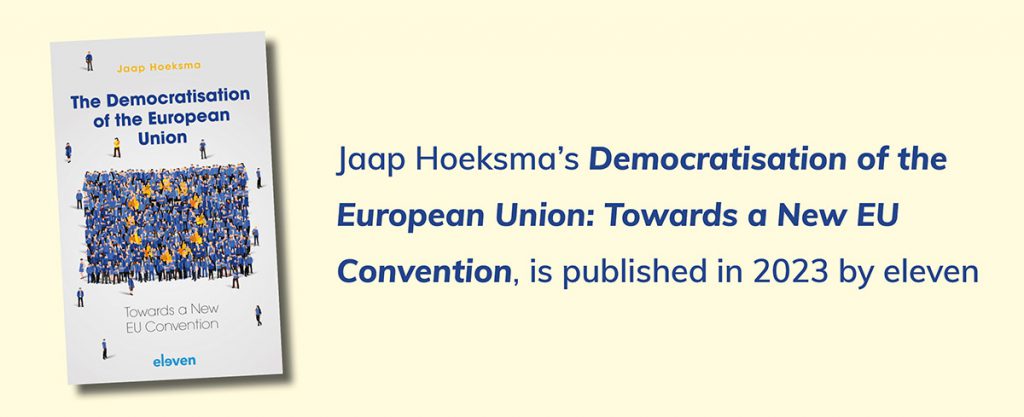Jaap Hoeksma argues that a European Court of Justice ruling in 2022 legally overcame the EU’s longstanding democratic deficit. The EU should now draw on the implications of that ruling, and declare itself an original model of democracy
On 16 February 2022, the EU Court of Justice delivered a highly significant verdict. However, it is a verdict that has received insufficient attention to date.
The Court had been asked to rule on a challenge brought by Hungary and Poland to the so-called conditionality mechanism governing the EU budget. This mechanism makes the receipt of EU funding subject to a country’s respect for the rule of law.
It was a challenge that went to the heart of the entire European integration project.
The Court’s verdict was unequivocal. It dismissed ‘the actions brought by Hungary and Poland against the conditionality mechanism which makes the receipt of financing from the Union budget subject to the respect by the Member States for the principles of the rule of law.’

The Court highlighted that the member states had first agreed on their common values and subsequently applied these values to their Union. The EU, it stated, had evolved to become ‘a Union of democratic States, which also constitutes a democracy of its own’.
In this way, the Court stamped its authority on the historical unfolding of European integration, branding the EU as a democracy in its own right – and with its own distinctive model. The model is based on applying the values of democracy and the rule of law in an international organisation. The EU, then, is no longer merely a union of democratic states but a democracy of its own.
In short, the EU Court of Justice, in a single ruling, overcame decades of struggle over the EU’s so-called ‘democratic deficit.’
Despite the best intentions of its founding fathers, what became known as the ‘democratic deficit’ for decades haunted the European polity which emerged in the wake of the Second World War.
The European Community transformed into the European Union in 1992. Yet the EU drew criticism for failing even to meet its own criteria for accession to the Union. Candidate countries had to respect fundamental rules concerning democracy and the rule of law before they could obtain membership. The EU itself, however, was governed in a secretive way.
To gain membership, EU candidate countries had to respect fundamental rules concerning democracy and the rule of law. Yet 'Brussels' became a synonym for secrecy
Decisions were taken behind closed doors and ‘Brussels’ became a synonym for secrecy. Some human rights campaigners and academics even perceived the EU as a threat to democracy and the rule of law.
The debate over the democratic deficit was exacerbated by ideological differences between federalists and intergovernmentalists about what kind of democracy the emerging polity should be pursuing.
The federalists argued that European integration was destined to result in the creation of a United States of Europe. The intergovernmentalists, meanwhile, envisaged the establishment of a Europe of Nation States.
As a consequence, the European polity and its stakeholders faced an apparent dilemma. They could either enjoy European democracy without national sovereignty or foster national sovereignty without European democracy.
In reality, however, history took its own course. The desire to lay the foundations for an ever-closer union among the peoples of Europe, expressed in the preamble to the 1957 Treaty of Rome, developed in a step-by-step process.
As constitutional democracies, the member states started to agree on the principal values they held in common. In the 1973 Declaration on European Identity, they described their emerging polity as a ‘Union of democratic States’. Shortly afterwards, they gave their polity a glimmer of democratic legitimacy by changing their parliamentary assembly into a directly elected Parliament.
EU citizenship was introduced in 1992, principally to complete the internal market. But at the same time, it laid the foundation for a common democracy. EU citizens received full status through the Charter of Fundamental Rights, integrated in the 2007 Lisbon Treaty.
The 2022 Court of Justice ruling frames the history of the EU to date. In many ways, it completes a process that until now had continued to be in dispute
Gradually, a dual democracy began to take shape. Notwithstanding the ideological premises, the Union of democratic States started to become a democracy of its own, too.
We should not read the 2022 ruling of the EU’s Court of Justice as merely an abstract legal argument. Rather, it frames (some might argue reframes) the history of the EU to date. In many ways, it completes a process that until now had continued to be in dispute.
It must be said, however, that the EU has not made a great noise about the implications of the Court’s rulings for its democracy. True, it may take many years (and many books) to elaborate on the Court’s conclusion. Yet, the positive result of the Court’s findings is clear, and means that the EU has overcome its paralysing deadlock. It may now present itself as a European democracy and concentrate on the protection and evolution of its original system of dual democracy.
Since the 2022 ECJ ruling, the EU may now present itself as a European democracy and concentrate on the protection and evolution of its original system of dual democracy
Europaserver currently defines the EU as ‘an economic and political union between 27 European countries’. But the union has outgrown this description. The EU should rephrase the definition of itself into something that sounds much more self-confident. I suggest: ‘a union of states and citizens which works as a European democracy’.
Interestingly, the EU is the only international organisation invited by President Biden to the forthcoming Summit for Democracy. The EU should view this as an encouragement to embrace its democratic identity and present itself at the global level as a democratic regional polity.